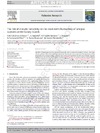Please use this identifier to cite or link to this item:
https://accedacris.ulpgc.es/jspui/handle/10553/4056
| Title: | The role of climatic variability on the short-term fluctuations of octopus captures at the Canary Islands | Authors: | Caballero Alfonso, Ángela María Ganzedo López, Unai Trujillo-Santana, Aarón Polanco, J. Santana del Pino, A. Ibarra-Berastegi, G. Castro-Hernández, J. J. |
UNESCO Clasification: | 310506 Técnicas pesqueras 240102 Comportamiento animal 2502 Climatología 240401 Bioestadística |
Keywords: | North-Atlantic Oscillation Vulgaris Ocean Temperature Patterns, et al |
Issue Date: | 2010 | Journal: | Fisheries Research | Abstract: | The effect of temperature on the common octopus life cycle has been well studied. However, how other climatic patterns affect them is poorly understood. The present work emphasises the importance of the temperature on common octopus catches by the small-scale trap fishery off the Canary Islands, and also highlights the effect of the North Atlantic Oscillation (NAO) pattern. As well as an inverse and significant correlation between octopus abundance (measured as CPUE) and Sea Surface Temperature (SST), a direct relationship between abundance and NAO, off the Canary Archipelago, is reported. Using a linear model (lm) with a stepwise procedure, SST is found to be the most important and significant variable in autumn, accounting for 34.21%. Meanwhile, the NAO became more important in spring with 28.64% and a 31.13% of the explained variance in autumn. | URI: | https://accedacris.ulpgc.es/handle/10553/4056 | ISSN: | 0165-7836 | DOI: | 10.1016/j.fishres.2009.12.006 | Source: | Fisheries Research [ISSN 0165-7836], v. 102 (3), p. 258-265 |
| Appears in Collections: | Artículos |
SCOPUSTM
Citations
31
checked on Jun 8, 2025
WEB OF SCIENCETM
Citations
30
checked on Feb 15, 2026
Page view(s) 5
564
checked on Jan 15, 2026
Download(s)
433
checked on Jan 15, 2026
Google ScholarTM
Check
Altmetric
Share
Export metadata
This item is licensed under a Creative Commons License

